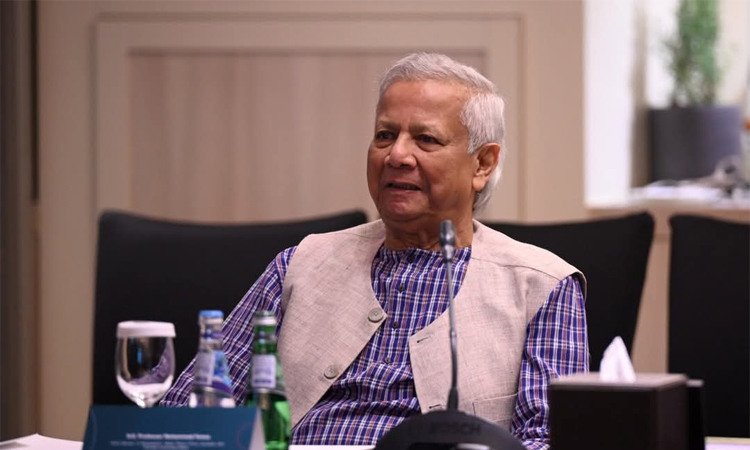News Flash
News Flash

DOHA (Qatar), April 23, 2025 (BSS) - Chief Adviser Professor Muhammad Yunus today said the prolonged Rohingya crisis may affect the security and stability in the entire Asia region, calling for working collectively towards lasting solutions to the crisis.
"Let us work - together- for humanity, for stability and for justice," he said while addressing a high-level roundtable titled "Social and Environment Challenges Around Forcibly Displaced Populations-The Case of the Rohingya" at Mandarin Oriental Hotel here this morning.
In his speech, Prof Yunus said prolonged stay of the Rohingyas poses enormous challenges to Bangladesh and making these Rohingyas frustrated.
He observed that rise in criminal activities in the refugee camps in Bangladesh and attempts of illegal migration are clear signs of desperation among them.
"If the problem persists further, it may affect the security and stability of the entire region and jeopardise development initiatives," he added.
Unfortunately, the chief adviser said international attention is gradually shifting from the Rohingya crisis due to various conflicts arising at different corners of the globe.
He said Qatar can use its good offices to put pressure on Myanmar for starting repatriation of Rohingya people without any further delay.
Given the renewed international geopolitical and geostrategic scenario, Qatar can strongly express their solidarity to resolve the issue and be proactive to engage the OIC countries to raise more funds and impose pressure on the international community to advocate for the repatriation of the Rohingyas, he said.
"Let us ensure that today's discussion does not conclude with formalities alone, but marks the beginning of a meaningful partnership - one that keeps the Rohingya crisis at the forefront of our shared humanitarian priorities and works collectively toward lasting solutions," Prof Yunus said.
The chief adviser said Bangladesh is currently hosting about 1.3 million forcibly displaced Myanmar nationals (Rohingyas), while 32,000 newborns are being added yearly.
Despite numerous challenges and constraints, he said Bangladesh is giving shelter to such a huge number of Rohingyas only on humanitarian considerations.
"Bangladesh considers sustainable repatriation as the only solution to the current crisis," he added.
About the chaotic situation in Myanmar, Prof Yunus said recently, the situation in Rakhine has undergone dramatic changes.
The Arakan Army now controls the 271-km Bangladesh-Myanmar Border and 14 of Rakhine's 17 townships, he said, adding that as of February 2025, Rakhine's total internally displaced population stands at 538,876 individuals.
"Among them, 152,071 stateless Rohingya remain in 21 protracted camps and three villages. Additionally, 386,805 (mostly Rakhine) people are newly displaced across 1,219 different sites, reflecting the ongoing humanitarian crisis in the region," he said.
Due to Myanmar's ongoing armed conflict, fresh arrivals of Rohingyas in Bangladesh since November 2023 crossed 100,000, the chief adviser mentioned.
Since February 2024, he said being attacked by the Arakan Army, 909 Myanmar security personnel have taken refuge inside Bangladesh of their own volition.
Among them, 875 were repatriated to Myanmar, with another 34 to be repatriated soon, he said.
Prof Yunus, also 2006 Nobel Peace Laureate, said regrettably, funding under the Joint Response Plan (JRP) for the Rohingya humanitarian crisis is decreasing.
For instance, he said the 2024 JRP achieved 64.4% of its funding target, securing US$ 548.9 million against an appeal of US$ 852.4 million.
The 2025-26 Joint Response Plan (JRP) for the Rohingya Humanitarian Crisis was launched on 24 March 2025, he said.
The chief adviser said between January 2025 to December 2025, the JRP requires $934.5 million for 1.48 million people, including the Rohingyas sheltered in Cox's Bazar and Bhasan Char and also Bangladeshi host communities in Ukhiya and Teknaf.
Recently, he said the USA, the largest donor of the JRP, has cut foreign assistance, which is likely to exacerbate the existing precarious scenario of funding further.
"Recently, huge concerns were raised when the WFP declared it would cut off food assistance for Rohingyas from April 2025. Finally, the WFP could manage some immediate funding and avoid fund-cutting," Prof Yunus said.
However, he said the WFP informed that if adequate funding is not ensured, they will face a fund shortage again from September 2025.
"Bangladesh is actively cooperating with the international community to maintain a continuous supply of funding. Qatar may come forward in this regard," he said.
The chief adviser said Bangladesh will organise a "High-Level Conference on the Situation of Rohingya Muslims and Other Minorities in Myanmar" under UN auspices, probably in September 2025 in New York.
He said Bangladesh expects high-level political participation and cooperation from Qatar in the conference.
Prof Yunus extended his sincere gratitude to the Qatar Foundation for organising the today's gathering and for continuing to champion conversations that go beyond policy statements-conversations that strive for solutions, accountability, and solidarity.
He said the today's meeting is not a ceremonial event; it is a working group, a gathering of minds and institutions that can act and must act.
"The composition of this table-government representatives, international organisations, non-profits, and private sector stakeholders - reminds us that the Rohingya crisis is not simply a humanitarian concern; it is a multidimensional challenge with social, economic, political and environmental implications," Prof Yunus said.
Foreign Adviser Md Touhid Hossain, National Security Adviser Khalilur Rahman, Energy Adviser Muhammad Fouzul Kabir Khan, Principal Coordinator on SDG Affairs Lamiya Morshed and Chief Adviser's Press Secretary Shafiqul Alam, among others, joined the meeting.